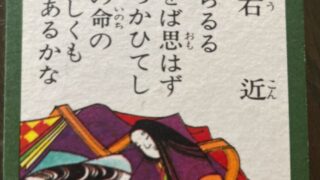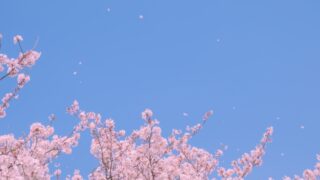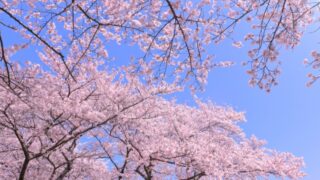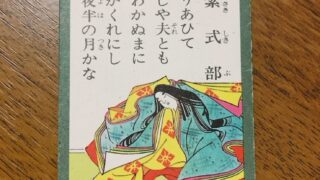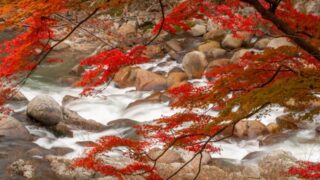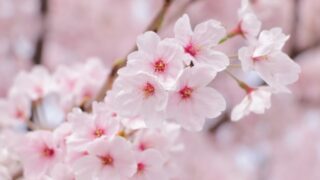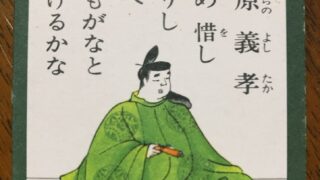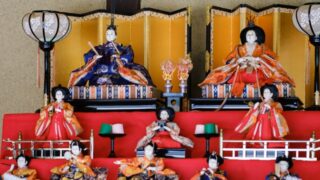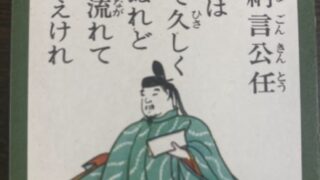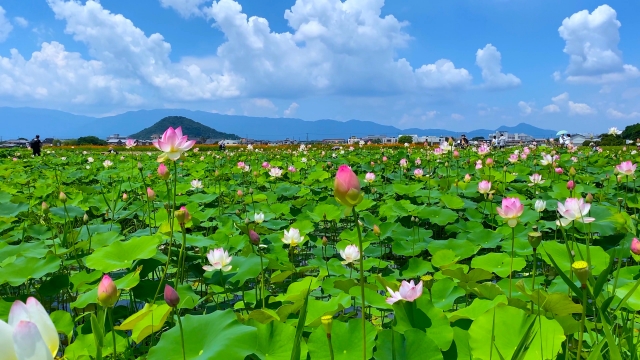先週は太陽のフレアの影響で、多くの地域でオーロラが見られたようですね。私の住んでいるところでは見られませんでしたが、学習者のみなさんにたくさんの写真を見せてもらえました。みなさん「実際のオーロラより、写真の方がきれいです」とおっしゃっていましたが、とてもきれいなオーロラでした。
Last week, due to solar flares, I heard that the Northern Lights could be seen in many areas. I couldn’t see them where I live, but the learners showed me many photos. Everyone said the pictures were more beautiful than the actual auroras, but they were amazing.
| ~の影響で | under the influence of ~ |
| 実際の~ | the actual ~ |
春すぎて 夏来にけらし 白妙の 衣ほすてふ 天の香具山
持統天皇 (645-703)
百人一首 二番
新古今和歌集 夏
じとうてんのう
ひゃくにんいっしゅ
しんこきんわかしゅう なつ
かな
はるすぎて なつきにけらし しろたへの ころもほすてふ あまのかぐやま
「しろたへの」は「しろたえの」、「ほすてふ」は「ほすちょう」と読みます。
言葉の意味
| 春すぎて | 春が過ぎて | spring has passed |
| 夏来にけらし | 夏が来たようだ | summer seems to have arrived |
| 衣ほすてふ | 着物を干すと言われている | It is said (someone) to dry the kimonos |
「白妙の」は真っ白な布という意味ですが、「枕詞」としてよく使われています。形容詞のひとつですが、一緒に使う言葉が決まっています。枕詞にあまり意味はありません。和歌の中で、リズムを整えるために使います。
「白妙の」は、「衣」、「袖」、「帯」などの着物に関係する言葉、「富士」など雪に関係する言葉と一緒に使います。 以下の記事でも枕詞について、説明しています。読んでみてください。
”Shirotaeno” means “pure white cloth,” but it is often used as a pillow talker. It is a kind of adjective, which has certain words that are used with it. Pillow words do not have much meaning. They are used in waka poems to set the rhythm.
”Shirotaeno” is used with words related to kimono such as “robe,” “sleeve,” and “obi,” and words related to snow such as “Fuji. The following article also explains and describes pillow words. Please read it.
「天の香久山」は、奈良県にある山です。この歌が詠まれた時より前の時代に、都がありました。この山に関係のある神話が数多くあります。
”Amanokaguyama” is a mountain located in Nara Prefecture, Japan. There was a capital there in the period before the time when this poem was composed. There are many myths related to this mountain.
| 真っ白 | pure white |
| リズムを整える | set the rhythm |
| ~に関係する… ~に関係のある… | … related to ~ |
枕詞を使っている歌です。
現代語訳
春が過ぎて、夏が来たようです。天の香久山では、この季節に真っ白な布を干していたと言われています。その景色が見えるようです。
Spring has passed and summer seems to have arrived. I heard that in the Amanokaguyama pure white clothes were hung out to dry at this time of year. This season makes me as if I see that landscape.
この歌は、私が百人一首で一番好きな歌のひとつです。 青い空、緑の山、真っ白な布が干されている景色が目に浮かんできませんか?
夏の初めのこの時期は、気持ちよく晴れて、過ごしやすい季節です。この歌を見ると、鮮やかな色、気持ちのいい景色が、見える気がします。
This is one of my favorite poems in the Hyakunin Isshu. Do you feel as if you see the blue sky, green mountains, and pure white clothes drying out?
It is a pleasantly sunny and pleasant time of year at the beginning of summer. When I see this poem, I can see bright colors and refreshing scenery.
和歌は、美しいと感じるもの、楽しいと感じるもの、辛いと感じるものなど、心を動かすものを他の人と共有するという考え方で詠まれています。そのため、春の桜、夏の空や水、秋の紅葉など、誰もが美しいと感じるものが、よく取り入れられています。
Waka poems are composed with the idea of sharing with others what moves them, such as what they find beautiful, enjoyable, or painful. For this reason, waka often incorporates things that everyone finds beautiful, such as cherry blossoms in spring, the sky and water in summer, and autumn leaves in autumn.
山の無いところにいても、この歌を見ると、青い空、緑の山、真っ白な布が干されている景色が目に浮かんできて、さわやかな気持ちになります。また、目の前で美しいものを見ていなくても、想像だけで、歌を詠むこともできます。
天の香久山で白い布が干されている景色を、この歌の作者の持統天皇も見てはいません。しかし、5月の気持ちのいい空を見て、昔の人が干していた白い布を想像し、この歌を詠んだのでしょうね。
Even if you are in a place without mountains, when you see this poem, the blue sky, green mountains, and pure white clothes hung out to dry come to mind and make you feel refreshed. Even if you do not see something beautiful in front of your eyes, you can compose a poem just by imagining it.
The author of this poem, Emperor Jito, did not see the scenery of white clothes drying at the foot of Mt. Amanokaguyama. However, looking at the pleasant sky in May, she may have imagined the scenery of people in ancient times drying white cloths and composed this poem.
| 目に浮かぶ | can imagine ~ ~ comes to mind |
| V-る気がする | feel as if I ~ |
| ~を共有する | share ~ |
この歌の作者、持統天皇は女性の天皇です。過去に存在した女性の天皇は、夫が亡くなった後などに、一時的に即位していました。
持統天皇は、当時の法律を部下に命じて、整備しました。
The author of this poem, Emperor Jito, was a female emperor. Female emperors who had existed in the past had ascended to the throne temporarily, for example, after the death of their husbands.
Emperor Jito ordered his subordinates to maintain the laws of the time.
| 存在する | exist |
| 亡くなる | pass away |
| 即位する | ascended to the throne |
| 命じる | order |
| 整備する | maintain, legislate |
今日もここまで読んでくれてありがとうございました。初夏の色をイメージさせる歌、どうでしたか。楽しんでくれているとうれしいです。
Thank you for reading this far today. How did you like the song that evokes the colors of early summer? I hope you enjoyed it.
